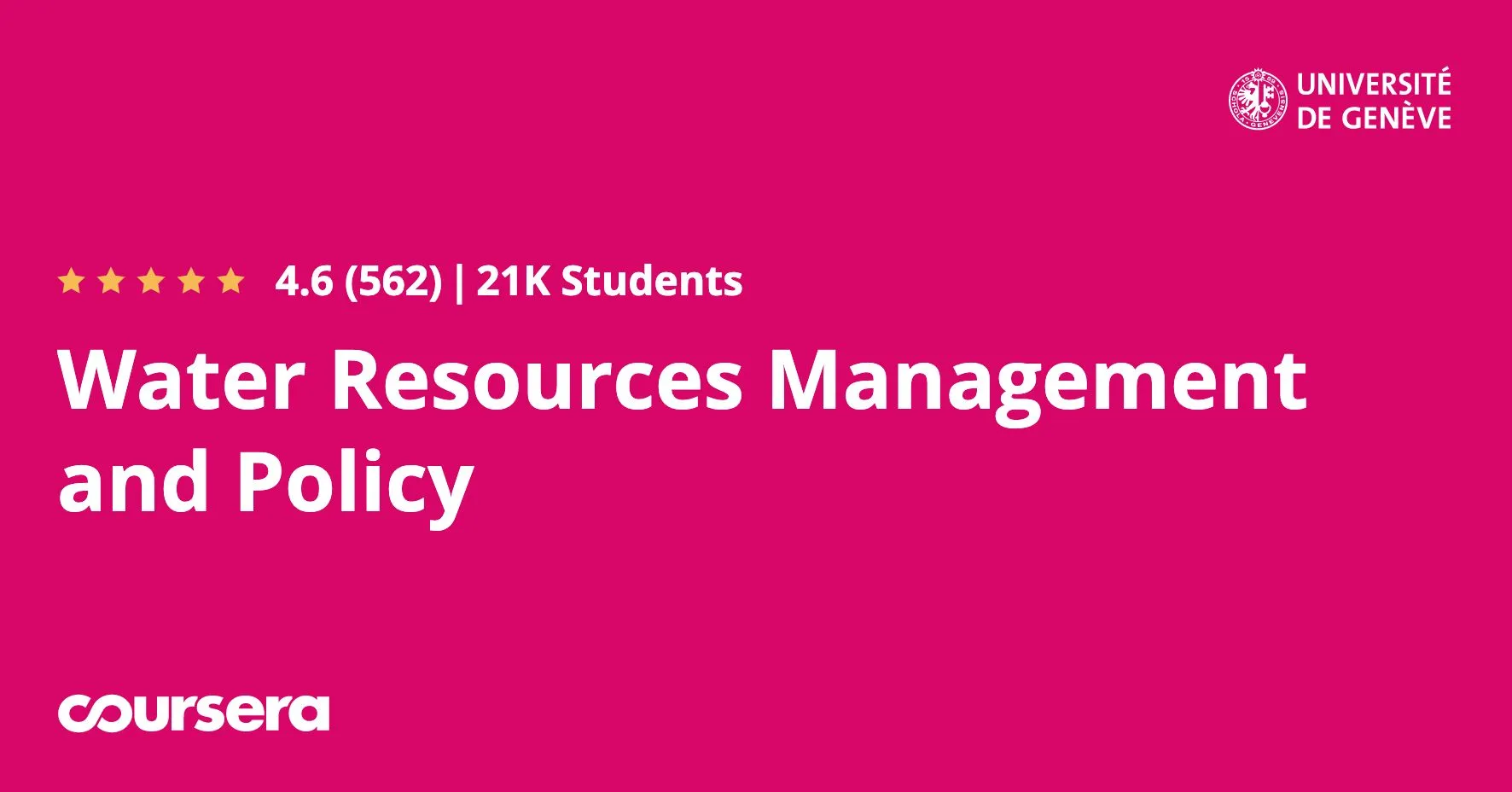
Water Resources Management and Policy 
Water resources management and policy are increasingly important in today's world, as climate change and human activity have created new challenges for the sustainable use of water. Effective management and policy are essential for ensuring a secure water supply. ▼
ADVERTISEMENT
Course Feature
![]() Cost:
Cost:
Free
![]() Provider:
Provider:
Coursera
![]() Certificate:
Certificate:
No Information
![]() Language:
Language:
English
![]() Start Date:
Start Date:
Self Paced
Course Overview
❗The content presented here is sourced directly from Coursera platform. For comprehensive course details, including enrollment information, simply click on the 'Go to class' link on our website.
Updated in [March 06th, 2023]
This course provides an overview of water resources management and policy. Students will learn to identify the major issues and strategies associated with water resource management. They will also gain an understanding of the numerous variables (environmental, institutional, and political) that affect water and may necessitate management adjustments. Through the course, students will obtain the key reading material required to comprehend these variables. By the end of the course, students will have a comprehensive understanding of water resources management and policy.
[Applications]
At the end of this course, students should be able to apply the knowledge they have gained to identify and address water resource management issues. They should be able to analyze the environmental, institutional, and political variables that affect water and develop strategies to manage them. Additionally, they should be able to identify and access the key reading material required to understand the complexities of water resource management.
[Career Paths]
1. Water Resources Manager: Water Resources Managers are responsible for the management and protection of water resources. They develop and implement policies and regulations to ensure the safe and efficient use of water resources. They also monitor water quality and quantity, and work with stakeholders to ensure that water resources are used responsibly. As the global population continues to grow, the demand for water resources is increasing, making this an important and growing field.
2. Water Resources Engineer: Water Resources Engineers are responsible for designing and constructing water infrastructure projects. They develop plans for water supply systems, wastewater treatment plants, and other water-related projects. They also analyze the impact of water resources on the environment and develop strategies to mitigate any negative impacts. As the demand for water resources increases, the need for Water Resources Engineers is expected to grow.
3. Water Resources Scientist: Water Resources Scientists are responsible for researching and analyzing water resources. They study the physical, chemical, and biological properties of water and develop strategies to protect and manage water resources. They also monitor water quality and quantity, and develop plans to ensure the safe and efficient use of water resources. As the global population continues to grow, the demand for Water Resources Scientists is expected to increase.
4. Water Resources Policy Analyst: Water Resources Policy Analysts are responsible for researching and analyzing water resources policies. They develop strategies to ensure the safe and efficient use of water resources, and work with stakeholders to ensure that water resources are used responsibly. They also monitor water quality and quantity, and develop plans to mitigate any negative impacts. As the demand for water resources increases, the need for Water Resources Policy Analysts is expected to grow.
[Education Paths]
1. Bachelor of Science in Water Resources Management: This degree program provides students with a comprehensive understanding of the science and management of water resources. Students learn about the physical, chemical, and biological processes that affect water resources, as well as the legal, economic, and social aspects of water management. This degree is becoming increasingly popular as the demand for water resources management professionals grows.
2. Master of Science in Water Resources Management: This degree program provides students with an advanced understanding of the science and management of water resources. Students learn about the physical, chemical, and biological processes that affect water resources, as well as the legal, economic, and social aspects of water management. This degree is becoming increasingly popular as the demand for water resources management professionals grows.
3. Doctor of Philosophy in Water Resources Management: This degree program provides students with an in-depth understanding of the science and management of water resources. Students learn about the physical, chemical, and biological processes that affect water resources, as well as the legal, economic, and social aspects of water management. This degree is becoming increasingly popular as the demand for water resources management professionals grows.
4. Master of Public Administration in Water Resources Management: This degree program provides students with an understanding of the public policy and management of water resources. Students learn about the legal, economic, and social aspects of water management, as well as the physical, chemical, and biological processes that affect water resources. This degree is becoming increasingly popular as the demand for water resources management professionals grows.
Course Syllabus
General Introduction
Introduction to Module
The Main Challenges in Water Governance I: Uses, Rules and Territories
The Main Challenges of Water Governance II: Multisectoriality, Funding and Management Modes
The Concept of Resource (Use, Scarcity and Rivalry)
The Resources Types, their Uses and Pressure
Common Goods: the Water Example
The Tragedy of the Commons and the Problems of Collective Action
The Governance of Common Goods. Between the State and the Marketplace
Common Pool Resources Institutions (CPRI)
Case study I: Community Water Management in Latin America
Case study II: Networking Actions of Community Organisations in Latin America
Conclusion of Module 1
Pros & Cons

Provides insight into interstate and international water disputes.

Offers practical examples of water management.

Easy to understand concepts.

Course is offered in French with English subtitles.

No translations provided for diagrams and definitions.

Structure and presentation of the course is lacking.
Course Provider

Provider Coursera's Stats at AZClass
Discussion and Reviews
0.0 (Based on 0 reviews)
Explore Similar Online Courses

GMAT Official Guide 13: Sentence Correction Explanations

Free ClickFunnels Tutorial - Clickfunnels 2022: Sales Funnel & Courses + FREE Funnels!

Python for Informatics: Exploring Information

Social Network Analysis

Introduction to Systematic Review and Meta-Analysis

The Analytics Edge

DCO042 - Python For Informatics

Causal Diagrams: Draw Your Assumptions Before Your Conclusions

Whole genome sequencing of bacterial genomes - tools and applications

The Ideal of Self-Governance: Public Policy Beyond Markets and States

Public Administration


Start your review of Water Resources Management and Policy